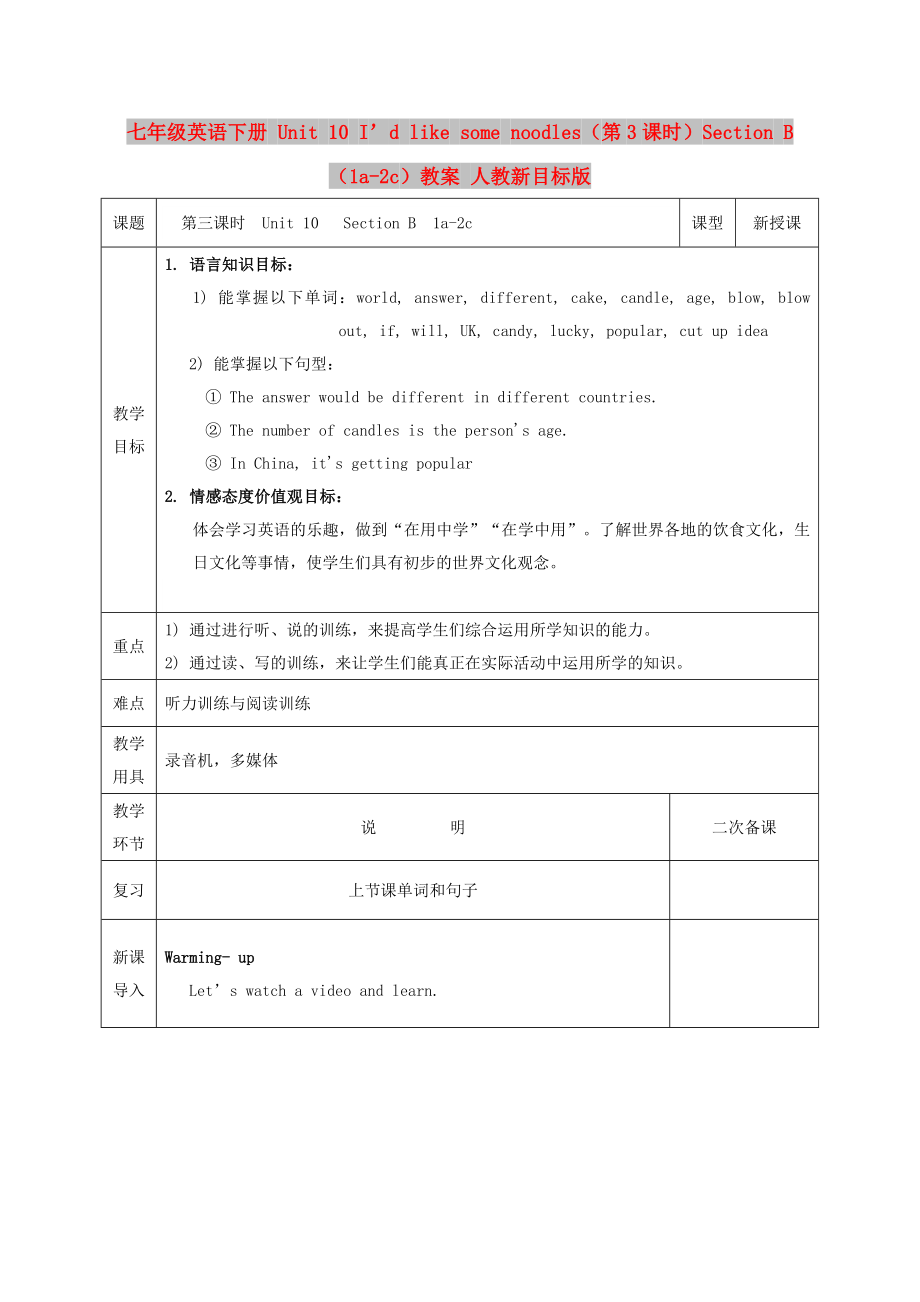《七年級(jí)英語下冊(cè) Unit 10 I’d like some noodles(第3課時(shí))Section B(1a-2c)教案 人教新目標(biāo)版》由會(huì)員分享����,可在線閱讀��,更多相關(guān)《七年級(jí)英語下冊(cè) Unit 10 I’d like some noodles(第3課時(shí))Section B(1a-2c)教案 人教新目標(biāo)版(4頁(yè)珍藏版)》請(qǐng)?jiān)谘b配圖網(wǎng)上搜索�。
1��、七年級(jí)英語下冊(cè) Unit 10 I’d like some noodles(第3課時(shí))Section B(1a-2c)教案 人教新目標(biāo)版
課題
第三課時(shí) Unit 10 Section B?1a-2c
課型
新授課
教學(xué)目標(biāo)
1. 語言知識(shí)目標(biāo):
1) 能掌握以下單詞:world, answer, different, cake, candle, age, blow, blow out, if, will, UK, candy, lucky, popular, cut up idea
2) 能掌握以下句型:
① The answer would be differ
2�、ent in different countries.
② The number of candles is the person's age.
③ In China, it's getting popular
2. 情感態(tài)度價(jià)值觀目標(biāo):
體會(huì)學(xué)習(xí)英語的樂趣,做到“在用中學(xué)”“在學(xué)中用”����。了解世界各地的飲食文化,生日文化等事情����,使學(xué)生們具有初步的世界文化觀念。
重點(diǎn)
1) 通過進(jìn)行聽���、說的訓(xùn)練���,來提高學(xué)生們綜合運(yùn)用所學(xué)知識(shí)的能力。
2) 通過讀�、寫的訓(xùn)練,來讓學(xué)生們能真正在實(shí)際活動(dòng)中運(yùn)用所學(xué)的知識(shí)�����。
難點(diǎn)
聽力訓(xùn)練與閱讀訓(xùn)練
教學(xué)用具
錄音機(jī),多媒體
教學(xué)環(huán)節(jié)
3��、
說 明
二次備課
復(fù)習(xí)
上節(jié)課單詞和句子
新課導(dǎo)入
Warming- up
Let’s watch a video and learn.
課 程 講 授
?Ⅱ. Presentation
1. (show some pictures of food on the big screen)
Present some new words and expressions to the Ss.
2. Ss learn the new words and expressions by themselves and tr
4��、y to remember them.
3. Work on 1a:
Read the words in the chart and look at the pictures below. Write the letters of the foods or drinks on the line. Then check the answers.
4. Let Ss try to remember the new words and expressions.
Ⅲ. Pairwork
1. Circle the things you like in 1a. Put an х ne
5�、xt to the things you don’t like Then tell you partner what you like and don't like.
Sa: I like dumplings, but I don't like noodles.
Sb: Well, I like fish but I don't like meat.
2. Work in groups. Talk about what you like and what you don’t like.
3. Make a list of things every one likes a
6、nd dislikes in your group. Then give a report to your classmates:
In our group, Sa likes dumplings but she doesn't like noodles. Sb likes fish but she doesn't like meat. …
4. Let some Ss give their report.
Ⅳ. Listening
Work on 1c:
1. Ask Ss to read the ORDER FORM carefully.
2. Play the
7����、 tape for the Ss to listen and plete the food order form.
(Play the recording for the first time, students only listen carefully.
Then, listen to the recording again, and write down the names of the foods. )
Work on 1d:
Listen again. Use the pause button to check the answers with the Ss.
Ⅴ.
8����、 Group work
1. Work in groups. Discuss what do you do or eat on your birthday?
2. Ss take turns to talk about it.
S1: I usually get many nice gifts from my parents. I usually have a nice dinner in a restaurant.
S2: My parents usually buy me some nice books and school things on my birthday.
9、 S3: ….
3. Write down what your group members do on their birthday. And give a report to the class.
In my group, S1… S2… S3…
Ⅵ. Presentation
1. (show some pictures of the new words in the passage on the big screen)
Present some new words and expressions to the Ss.
2. Ss learn the
10����、new words and expressions by themselves and try to remember them.
Ⅶ. Reading
1. Fast reading
True or False
2. Careful reading
Read the passage plete the chart below.
閱讀指導(dǎo):
首先,讀表格�,記住這四空格,分別是在美國(guó)及中國(guó)人們?cè)谶^生日時(shí)所吃的食物及他們的特殊含義��。其次��,帶著問題去仔細(xì)讀短文��,并在短文中尋找相關(guān)問題的回答依據(jù)。然后���,根據(jù)相關(guān)依據(jù)�,將答案寫在空格處���。
3. Read the m
11����、essages again. Find the answers to the questions in 2c.
閱讀指導(dǎo):首先��,讀這四個(gè)問題���,記住這四個(gè)問題��。其次�,帶著問題去仔細(xì)讀短文���,并在短文中尋找相關(guān)問題的回答依據(jù)����。然后��,根據(jù)相關(guān)依據(jù),寫出問題的答案���。
Check the answers with the Ss.
VIII. Language points
IX. Exercise
小結(jié)
本節(jié)課重難點(diǎn)
作業(yè)布置
Homework
1. Remember the new words and expressions in this period.
12�、
2. 用下列詞匯造句:
1) around the world
2) in different countries
3) the number of 4) blow out
5) in one go 6) e true
7) get popular 8) cut up
板書設(shè)計(jì)
Section B 1a-2c
1a: 1.b 2. a 3, e 4. h 5. c 6. e 7. b 8. d 9. f
1b: I like dumplings, fish and orange juice.
I don't like onions, green tea or porridge.
2b: birthday cake, the wish will e true
long noodles, eggs, a symbol of long life;
symbol of life and good luck
課后反思
 七年級(jí)英語下冊(cè) Unit 10 I’d like some noodles(第3課時(shí))Section B(1a-2c)教案 人教新目標(biāo)版
七年級(jí)英語下冊(cè) Unit 10 I’d like some noodles(第3課時(shí))Section B(1a-2c)教案 人教新目標(biāo)版

